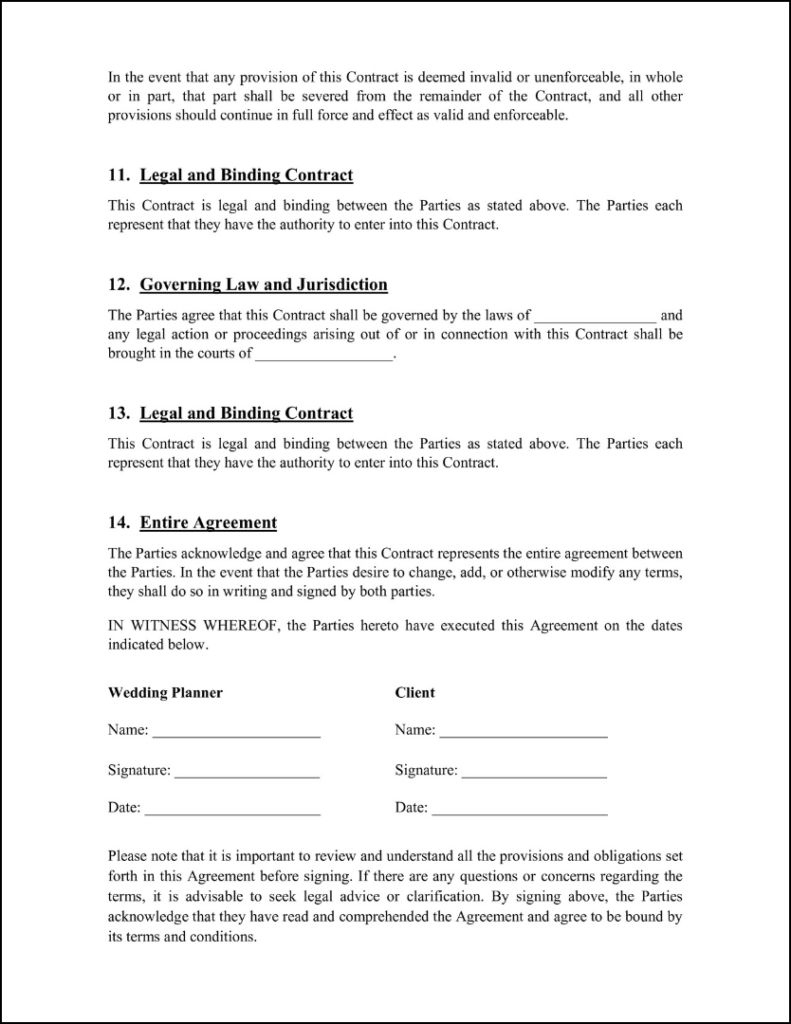
Planning a wedding can be an exciting yet overwhelming endeavour. From selecting the perfect venue to coordinating with vendors, every detail needs careful attention. To ensure a smooth and stress-free wedding planning process, many couples opt to hire a professional wedding planner. When entering into such a partnership, it is essential to have a well-drafted wedding planner contract in place. We understand the significance of a comprehensive Wedding Planner Contract, and to make your planning process easier, we are thrilled to offer you our free Wedding Planner Contract Template. Our professionally designed template covers all the essential aspects of a wedding planning contract, and it’s easily editable to suit your specific needs.


A wedding planner contract is a legally binding agreement between the couple and the wedding planner. It outlines the responsibilities, expectations, and terms of service for both parties involved. This contract serves as a crucial tool for ensuring clarity, avoiding misunderstandings, and protecting the interests of all parties throughout the wedding planning process. Typically, a Wedding Planner Contract covers the following agreements:
Access our free Wedding Planner Contract sample to safeguard your interests. Download now and take proactive steps toward a secure Wedding Planner Contract at no cost.
A wedding is a joyous occasion, filled with love and excitement, but it also involves intricate planning and coordination. In the midst of all the celebration, having a Wedding Planner Contract might not be the first thing that comes to mind, but it is undeniably crucial. Let’s explore why having a well-crafted contract is essential for a seamless and memorable wedding experience.
A Wedding Planner Contract serves as a roadmap, clearly defining the roles and responsibilities of both the couple and the wedding planner. By outlining the specific services the planner will provide, such as venue selection, vendor management, and event coordination, everyone involved gains a comprehensive understanding of their obligations. This clarity minimizes the chances of misunderstandings and ensures that everyone is on the same page throughout the planning process.
In the realm of wedding planning, professionalism is key. A detailed and professional contract demonstrates the commitment of the wedding planner to deliver exceptional services. It reassures the couple that they are working with a reliable and competent professional who will skillfully handle the logistics and bring their dream wedding to life. A contract not only sets the tone for a polished experience but also instils confidence in the couple that their special day is in capable hands.
While it’s not something anyone likes to dwell on, sometimes unexpected challenges arise during wedding planning. A well-structured contract offers legal protection for both the couple and the wedding planner. In the unfortunate event of any disputes or disagreements, the contract provides a solid foundation for resolution. It outlines the agreed-upon terms, payment details, and any contingency plans, safeguarding the interests of both parties involved.
Planning a wedding can be a rollercoaster of emotions, and the last thing anyone wants is added stress. With a comprehensive contract in place, the couple can focus on enjoying their journey to the altar, knowing that they have a dedicated wedding planner to manage the nitty-gritty details. The contract brings peace of mind, assuring the couple that their vision and wishes will be honored, and their big day will unfold seamlessly.
Weddings involve significant financial investments, and a Wedding Planner Contract helps minimize potential risks. By outlining the payment terms, including deposits and cancellation policies, the contract ensures that both parties are aware of the financial implications of any changes. It sets out clear guidelines for refunds and rescheduling, reducing the chance of financial complications in case of unforeseen circumstances.
Crafting a Wedding Planner Contract that ensures a seamless and delightful wedding experience requires attention to detail and clear communication. Here are five essential tips to consider when writing a comprehensive and effective Wedding Planner Contract:
Clarity is paramount in a Wedding Planner Contract. Clearly outline the scope of services that the wedding planner will provide. Include details about venue selection, vendor management, budgeting assistance, event design, and coordination on the wedding day. Avoid vague language and use specific terms to leave no room for ambiguity. The more detailed the contract, the better both parties understand their roles and responsibilities, leading to a smoother planning process.
While your passion lies in wedding planning, seeking advice from a legal professional is crucial when drafting the contract. A lawyer experienced in contract law can ensure that the document adheres to all relevant legal regulations and covers essential aspects to protect both the couple and the wedding planner. Their expertise will help you create a contract that stands up to legal scrutiny and provides a strong foundation for a successful collaboration.
Wedding plans can change for various reasons, and it’s essential to have a well-defined cancellation policy in the contract. Outline the circumstances under which either party can terminate the agreement and the procedures for doing so. Be transparent about any cancellation fees or penalties to avoid disputes later on. A clear cancellation policy protects both parties’ interests and fosters a sense of trust and professionalism in the planning relationship.
Weddings are live events, and unexpected circumstances can arise. It’s wise to plan for contingencies and include relevant clauses in the contract. For example, establish procedures for handling unforeseen emergencies, rescheduling the event, or adjusting services due to external factors beyond anyone’s control. Addressing these scenarios in advance ensures that both parties know how to navigate unexpected challenges without unnecessary stress or confusion.
A Wedding Planner Contract is not a one-and-done document. As the wedding planning industry evolves and your services or policies change, it’s essential to review and revise the contract regularly. Ensure that it stays current and relevant to your business practices and legal requirements. By keeping the contract up-to-date, you demonstrate professionalism and adaptability, setting a positive tone for your relationship with clients.